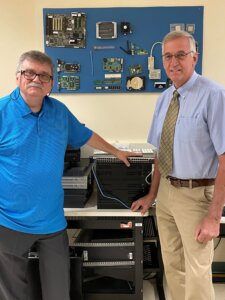Faculty Q&A: Kevin Behnke & Mike Harrison
Behnke, Harrison are Coordinators/Professors for the Information Technologies Program
 Great Bay’s Information Systems Technology Department is led by a powerhouse trio with a cumulative 100 years of real-world experience to pass along to their students.
Great Bay’s Information Systems Technology Department is led by a powerhouse trio with a cumulative 100 years of real-world experience to pass along to their students.
Department Chair Meg Prescott worked as a web developer and data base administrator before joining Great Bay, where she has won the Chancellor’s Award for Teaching Excellence and the Campus Compact’s Good Steward award. Her degrees are in math and science, and she has numerous information technology certificates.
Before joining Great Bay, Program Coordinator/Professor Kevin Behnke worked in the industry as a technical trainer and specialist, support engineer and as a courseware and program developer. On the academic side, he holds degrees in business administration and business education.
Michael Harrison, who shares Program Coordinator duties as an Associate Professor, racked up experience as a computer tech in the U.S. Navy and product engineer at GTE, Wang Labs, Cabletron, and Enterasys. He was a regular participant in IEEE Computer Society Conferences and published in trade journals. His degree is in electrical engineering.
The adjunct faculty bring diverse real-world experience with individual specialties, as well.
The IST department offers an associate in science degree, with coursework in computer hardware repair, computer networking, network security and network management. It offers related degrees in cyber security and computer information systems.
Interest is booming, with abundant jobs and interesting career opportunities. Industry pay is good and getting better, with average salaries of $71,000 for network specialists and $104,000 for cyber security specialists.
Behnke and Harrison, who both are Cisco Certified Network Associates, recently spoke via Zoom about the IST program at Great Bay.
Why is there so much interest in this field right now?
Kevin: Because there are so many jobs related to computers. There is nothing not touched by this field. But the interest is interesting. What we teach is sometimes now what students come to learn about. Most people will say, ‘You work with computers.’ You are not wrong when you say that, but that is not what I do. Computers happen to an end device, so I have to understand end devices. But my work is focusing on how to network. How are we talking to each other right now? It’s not magical. There is a defined process that happens in the background. That is what I focus on.
Students come in with a lot of knowledge they don’t realize they have. A lot of them have been playing with these tools since kindergarten. What is one of the first things you learn in grammar school? The keyboard, inputting. It’s natural for them. Mike and I take the knowledge they lack – how it all really works – and we fill in the blanks.
What distinguishes the Great Bay program?
Mike: Our ala cart approach is unique. We are not locked into specific roles here. My hobby and my background are micro controllers, so I specialize in that. We can offer that kind of ala cart menu because we have diverse chefs mixing the soup.
Where is the growth in the program coming from?
Kevin: We are seeing a lot of interest in cyber security, and that makes sense. Not a week goes by when you don’t read that we have been hacked by somebody. There is tremendous demand for and tremendous interest in cyber right now. The average salary for somebody with a solid five years of experience in cyber is somewhere in the $75,000 to $100,000-plus range, depending on where you live. It’s a very livable wage.
Mike: It’s also a relatively new field. Cyber security and the study of cyber security has been around for less than 10 years, max. The Great Bay program is four years old.
You both seem excited and inspired by your work.
Kevin: I am one of those people who actually loves his job. The great thing about working with this population, you don’t know who the next Bill Gates are Mark Zuckerberg is going to be. They did not do anything magical. Mark Zuckerberg wrote an application called Facebook so he could communicate across the college campus, and it blew up. The next Bill Gates or Mark Zuckerberg? You just don’t know.
Mike: So yes, it is exciting. We have a lot of knowledge and a lot of experience, and it’s fun to share it with students who are eager to learn.
Cyber Social Media / Cyber Security Certification
Did you know you could earn $100,000 a year as a cyber security specialist? Great Bay Community College offers one of the region’s only cyber security degrees as part of its Information Systems Technology curriculum. Demand for IT jobs has never been higher, and qualified cyber security specialists can expect to graduate from Great Bay with job offers in hand.
“Not a week goes by when you don’t read that we have been hacked by somebody. There is tremendous demand for and tremendous interest in cyber right now,” says IST Program Coordinator Kevin Behnke.
With small class sizes, flexible schedules, and faculty members who teach with real-world experience, Great Bay is the best place to start your IT training. Great Bay offers certificates and two-year degree, and many students continue their education through articulation agreements with four-year colleges.
For information about cyber security, system administration, network administration and other opportunities visit www.greatbay.edu/programs

